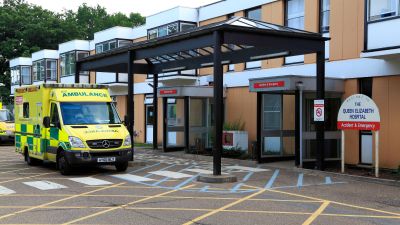Warning over ambulance delays after Norfolk woman dies following four hour wait outside hospital

A coroner has warned the health secretary that more people could die if problems with ambulance delays and overcrowded hospitals are not resolved.
The concerns come after a woman in Norfolk died following an over four hour wait in the back of an ambulance outside a hospital.
Earlier this month an inquest concluded that 61-year-old Lyn Brind died from cardiac arrest after delays at the Queen Elizabeth Hospital in King's Lynn meant there was no space for her to be transferred to from the ambulance.
In a rare move, Jacqueline Lake, senior coroner for Norfolk, has sent a prevention of future deaths report to the Health Secretary Steve Barclay.
In the report, Ms Lake said: "During the course of the investigation my inquiries revealed matters giving rise to concern.
"In my opinion there is a risk that future deaths could occur unless action is taken.
"Action should be taken to prevent future deaths and I believe you have thepower to take such action."
The report added that Mrs Brind's condition was "not diagnosed nor treated in a timely fashion" and that there was "no space in the hospital".
At the time of her death in May 2022, there were around 140 beds occupied at the hospital by patients who were fit to be discharged, but beds could not be found in the community.
Meanwhile, seven ambulances were waiting outside to take patients into the emergency department.
However, the coroner said that at the time of the inquest this number had risen to 17 ambulances regularly waiting outside with patients.
Ms Lake said: "Evidence was heard that there are regularly too many patients in the Emergency Department and so ambulances cannot safely transfer patients into the Emergency Department.
It was heard that this is a much wider and more complex problem, in that the Hospital is unable to discharge patients who are medically fit to be discharged and they remain occupying much needed beds.
"This in turn means patients cannot be moved from the Emergency Department into the hospital wards, and patients remain waiting in ambulances.
"This in turn causes delays in ambulances being returned to normal duty and being able to attend to emergencies in the community."
The Health Secretary must respond to the report by 13 March, including details of action taken or proposed to be taken.
In response to the report, a spokesperson for the Queen Elizabeth Hospital King's Lynn NHS Foundation Trust said: "The Trust extends their condolences to Mrs Brind’s family.
"Lessons have been learned and the NHS care standards for patients waiting in ambulances has been implemented, including working with ambulance staff to ensure that patients are still seen by a senior doctor if they cannot immediately come into the department, and completing 30 minute observations."
It was one of the biggest news stories of our time - and it's still not over. So what did Boris Johnson know about Downing Street’s notorious parties?
With fresh revelations from our Number 10 sources, in their own words, listen to the inside story...